#(hi. i need dunmeshi mutuals)
Explore tagged Tumblr posts
Text
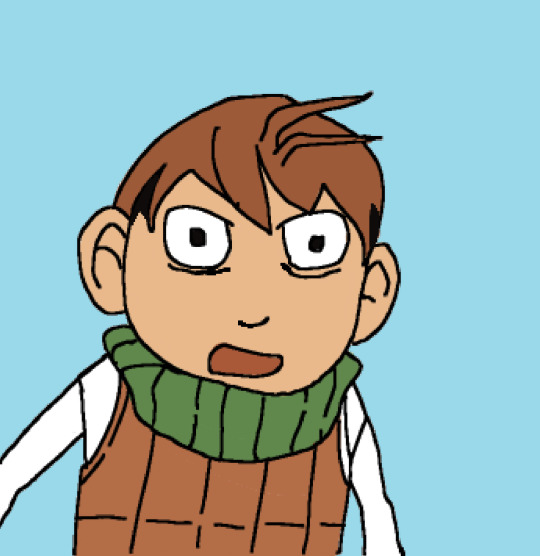
gracing this sideblog with this image as my first post
#(hi. i need dunmeshi mutuals)#chilchuck tims#dungeon meshi#shoutout to nat for making this for me i am forever in your debt
2K notes
·
View notes
Text
Talking w mutuals abt dunmeshi crossover when laios’ group finds 20 y old krs alone in the dungeon after lsh and cjs died in there
Marcille being a bad influence on krs by getting him into necromancy bc he wants his friends back
The gang +krs finding out abt the Curse tm and they get rid of it (and krs is left struck by guilt bc its bc of him his friends and his parents died oh god)
Senshi basically adopts him and feeds him like for the love of god please this boy needs to be reminded to eat
Izutsumi sibling bond
Laios and krs autism bonding (laios infodumps when krs goes nonverbal and laios listens carefully when krs has an infodumping moment abt the novel hes been reading)
Chilchuck teaches krs about workers rights and how to slack off as much as legally possible. Krs now has 2 (two) dads
The only drawing i can give for now is this thank you for listening to my ted talk

102 notes
·
View notes
Note
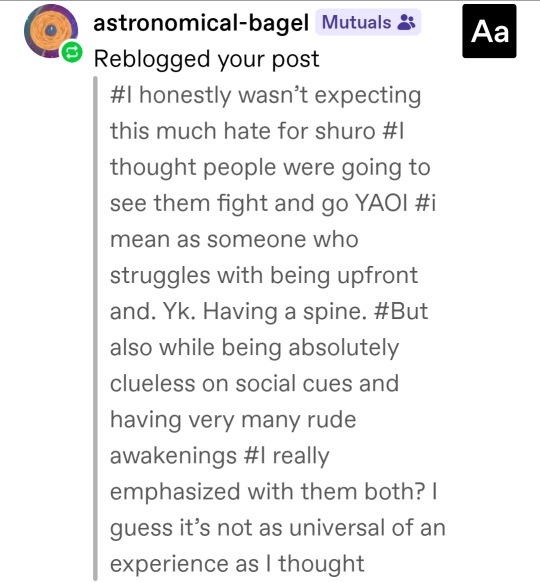
yo mutual i love ur tags fr because like u took the words right of my mouth i was so baffled how ppl would side with one more than the other because the autism pvp felt so real to me that i related to Both of them rlly a lot like. So much so it has cemented itself as rlly one of my fave scenes ever because it was a Step up for growth like that fight made them both better people . and it makes me mad ppl belittle toshiros experiences and like ignore his autism for the sake of pitting two bad bitches against each other Good Lord. The Nuance. There is Nuance. and ppl who ignore it just feels so personal to me as an autistic asian person who's been told that there's no way they're not "normal" like ive not been masking and not even like That well either.
Toshiro to me is like a similar vibe of Autism to Mob aka Shigeo Kageyama MP100 where he represses so much of his true feelings and opinions and emotions that he will just blow up one day (validly!!!) !!! like. let him be autistic in peace. not everything has to be a moral failure and not everything has to revolve around Laios just because hes the main character of Dunmeshi. Like they were both so relatable it hurts me...
not me spelling empathized as emphasized lmao
but yeah anyways I really interpret the shuro and laios conflict as just two autistic people who just don’t mesh naturally? At the very least, it’s a complication between two people with very different cultures.
Both laios and toshiro are people who don’t exactly fit in. On shuro’s side, the source of his ‘otherness’ is a little redirected (is that the word?) because his status and nationality already set him apart on the island, but even back home he was reserved and didn’t socialize well. He struggles to connect with others and has a hard time being sincere!!! the argument between him and laios isn’t an evil neurotypical vs blorbo autistic, it’s conflict-avoidant autistic vs social cue blind autistic!
There isn’t really a right or wrong side here, Shuro tried communicating in the way he knew how, but he and laios just simply don’t understand each other’s languages. Their fight is a reset for the both of them; now they each know a vital fact about each other! Laios knows that Shuro has a hard time verbalizing discomfort, and shuro now knows that Laios needs to be told things to understand them. Now they can both find a middle ground and properly compromise between their two opposites.
and it’s important to note that if laios did know he was making shuro uncomfortable, he would stop as best as he knew how, all the way. This guy takes boundaries seriously, as long as there are clear lines to what those boundaries are. And he’s attentive to other’s needs! (See: him and chilchucks friendship. They understand each other very well, I could write a whole meta on it)
Now that he and shuro are seeing eye to eye, their friendship can now progress in a healthier fashion! This fight isn’t the end of the world. (Honestly having a fist fight is like third base to me but we won’t speak of that) Toshiro isn’t evil, he’s just a really cool foil to Laios, and their disagreement serves to establish important parts of their characters and to progress both their character arcs 👍
#Also YESSS he is so similar to mob psycho. Repressing until you can’t anymore and have to beat someone up 😎✌️#Maintagging this bc I’m tired of the hate. Drown em out#toshiro nakamoto#laios touden#astronomically random#astronomical asks
58 notes
·
View notes
Text
Dunmeshi – Laios x Marcille ramblings
I find the idea of a ship between Marcille and Laios interesting, partly because it’s sort of impossible.
They do have a very close and intense relationship, and this intensity, I feel, is the appeal behind their relationship. However, that intensity is born out of their mutual love for Falin and when Marcille and Falin are together, Marcille tends to focus on Falin. Meaning, that Laios and Marcilles relationship is at it’s most intense when their goals are aligned by the desire to save Falin. So, let’s look at Laios and Marcilles’ relationship while they’re in the dungeon. I find that, a good moment in their relationship to look at is; when Marcille suggests using black magic to resurrect Falin.
It starts with Marcille suggesting the use of ‘Ancient magic’ which Senshi and Chilchuck immediately understand as Black magic and are against it’s use. Marcille turns to Laios and asks for his input and Laios asks Marcille to do it. In this scene, Marcille is asking the others to be be complicit in something extremely dangerous, illegal and unethical, and Laios agrees immediately. This shows the level of trust the two put in each other, but it also shows the major problem in their relationship, they’re both enablers. If either Marcille, or Laios were not present in that moment, Marcille wouldn’t have been able to use black magic. If Marcille didn’t have Laios there, Senshi and Chilchuck would likely made more efforts to stop Marcille and without Marcille, there’s no magic to begin with. It also shows that the two are, in a sense, wrong to trust each other. Both of them need someone to be their moral compass and to keep them in check, when Falin is around, she is this for both of them. Without Falin, however, both of them expect the other to be the one to stop them and neither of them will. Both are stated explicitly to have, either little to no sense of right and wrong, or no respect for what society considers right and wrong. In conclusion, Marcille and Laios together are two extremely powerful, driven people, who trust each other explicitly and have no moral compass between them. Meaning that a relationship between the two of them would be a calamity and I am here for it.
37 notes
·
View notes
Text
Hello hi welcome to my main blog!
If you want to refer to me, you can call me Alice or Ren. I'm trans, taken, and I'm a super cool astrophysicist studying for her PhD.
Mutuals, please don't hesitate to reach out if you wanna see certain stuff tagged for filtering reasons. I know I'd personally really appreciate images containing blood and gore to be tagged accordingly. Nothing else really bothers me enough to warrant hiding them, just those 2 things.
If you're curious what my face looks like check out #rensselfies.
If you play OSRS you should totally tell me your username and add me (Falin Touden) (yes I snagged an epic dunmeshi username).
If you're interested and I know you well enough, ask me about my Minecraft server! I've been meaning to breathe new life into it -- I need players badly.
I'm technically on other sites too but I'm not all that active on any of them right now. Also I've gotten in the habit of restricting what internet strangers can learn about me, so no more carrd.
Also, if you're looking for a math/physics tutor, hmu and we'll see if we can work something out. I won't be available during school semesters due to being kept busy by my studies. I also don't work for free (!!!!!!)
That is all for now. Byee!!
8 notes
·
View notes
Text
I think there's something fundamentally incomplete about analyzing the main protagonist of a story by a Japanese author and written primarily for a Japanese audience through the lens of their characterization being about white people.


Consider Edward Elric from Fullmetal Alchemist and Eren Yeager from Attack on Titan. Both characters are from European backgrounds - but both of their stories are, in their own ways, crafted to evoke particular aspects of Japan's history. People have written much about each of them, but for our purposes here, I think it suffices to say that they are both written to convey particular Japanese feelings and experiences in ways that their stories' Japanese audiences could relate to.
This of course does not mean that all anime and manga with non-Japanese protagonists must be writing them to be relatable to Japanese audiences. But it's my impression that most of them do so because that's what Japanese creators and audiences tend to be interested in, and this interview suggests that Laios is not an exception.
A lot of fans had a strong reaction to Laios and Toshiro's confrontation with one another. Quite a few fans on social media seemed to relate to Laios' difficulty with reading social cues and related it to their own experiences on the autism spectrum. Did you envision Laios as autistic when conceiving his character? How would you describe the friction between Laios and Toshiro? KUI: So my understanding is Laios is a really normal person; there's nothing special, and everyone can relate [to a person like him]. I also relate to him, so I don't think I'm writing anything special [regarding Laios]. That's why I think people can relate to or appreciate him. Some people might say Laios is a little bit autistic, but Shuro has his own difficulties. Everyone has their individual problems. It's not just Laios or Shuro; the problems are mutual. We always need to try to understand and learn from each other. Sometimes, you might hurt another person, but that's the process we need to understand other people.
Ryoko Kui describes Laios as normal and broadly relatable, both to herself and to people throughout her audience. Which, as many people have noted, appears to be a somewhat unconventional definition of normal - so while Laios might not feel normal or relatable to everyone, my takeaway is that Ryoko Kui sees Laios's characterization as feeling normal and relatable to herself and to most fans of Dungeon Meshi. Which is, of course, marketed primarily in Japan.
Ryoko Kui also describes her perspective on the conflict between Laios and Toshiro - that both of them, and all the other characters, have their own ways of accidentally hurting each other, and that none of these are particularly unique but rather part of a broader pattern of friction that can happen between people who need to learn to understand each other better.
Now, this is all paratext. The events of the story are what they are regardless, as are the real-world experiences that people can relate to the conflict between Laios and Toshiro. However, when we look back at the text of the story with this context in mind, some additional considerations emerge.
Let's look back at the first few assessments of Laios here:
Arguably, the most significant part of Laios' character is the societal ostracization he faces because of his non-normative interests and behavior. For the majority of his life, Laios struggles socially, and other humans mistreat him. When he rescues Marcille from the Nightmares, his nightmare dredges up his inability to fit into school and the army. During his early dungeoneering days, he's lied to and exploited by his fellow party members.
In response to how human society has othered him, Laios distances himself from humans and invests his time and energy into monsters and demi-humans instead. In the DunMeshi world, monsters and demi-humans are the ultimate societal Other. People fear them, exploit them, and even hunt and kill them. As someone who's similarly been mistreated by human society, Laios resonates deeply with monsters.
His desire to become a monster and/or beastman reflects his desire to reclaim agency over how society has ostracized him. If he chooses to become a monster, he gets to place value on what society has deemed despicable. He gets to choose why society hates him and be different on his own terms.
These reflect some patterns I've seen in a lot of anime and manga protagonists, particularly in isekai and other fantasy stories. That someone who didn't fit in with the society they grew up in might be drawn to and idealize an "other world" where they can be different on their own terms - this clearly resonates with plenty of Japanese fantasy fans!
Of course, isekai anime and manga typically has the protagonists being from Japan in the first place. Laios encountering a Japanese character and regarding him as an odd foreigner is more unusual, and fits into Dungeon Meshi's perspective on how no one character or background has all the answers. But there's more to their interactions than this.
Laios hits a lot of notes in what fans of fantasy anime and manga expect to look for in a relatable character. Toshiro, on the other hand, appears to be a samurai from a wealthy background with a number of servants. It seems to me that Toshiro was written to come off in particular as representing the traditionalist noble side of Japan, and that Laios's conflict with him can represent the experience of a Japanese person less adept at fitting into "proper" social standards clashing with someone more traditional who looks down on them for it.
The framing of Laios and Toshiro's conflict within the broader context of Dungeon Meshi appears to encourage this type of reading. While Laios's behavior towards Toshiro is particularly notable from a real-world perspective, the racial divides and privileges the story emphasizes much more are those between the fantasy "races", and there are a whole lot of prejudices and microaggressions about those flying around throughout the story.

A lot of these ideas show up in the shapeshifter arc - and Laios is the only one here to avoid caricatures of racial traits of any of the others. It's particularly notable with the depictions of Chilchuck - half-foots are the shortest-lived and generally most-looked-down-upon of the four, and it shows up in both Marcille and Senshi's interpretations of him.
But Laios does make a bunch of racial microaggressions against Toshiro. And what does Toshiro think of them?


It's not entirely clear. What we do see is that Toshiro lists off a lot of complaints he has with Laios's behavior - and things like "treating him like a weird outsider" and "getting his name wrong" don't seem to make the list, even of the things he's remembering without saying out loud. The only reason we even know what happened when Laios and Toshiro first met is a bonus comic that wasn't adapted into the anime.
Despite how much the racial microaggressions in Laios and Toshiro's first encounter might come off as being a defining aspect of the friction between them, the story does not appear to present them as such. It's not even clear if Toshiro actually objects to the nickname "Shuro" - in context of relevant real-world actions like the erasure of Asian Americans' names, Toshiro's "well, that's good enough" can fall flat, but we don't actually see him express displeasure with the name at any point even outside of Laios's presence - and in the interview above, Ryoko Kui herself refers to him as Shuro, while responding to a question where the interviewer refers to him as Toshiro.
A different story - perhaps one produced in the West - might do more exploring of the consequences these kinds of actions can have when faced by Asian Americans. But Dungeon Meshi does not appear to regard Laios and Toshiro's situation in quite that way - and in fact, unlike real-world white people but like real-world Japanese people, Laios does not belong to the racial background primarily privileged in his world.
That background is, of course, elves.

Elves have the longest lifespans and the most institutional power, with all sorts of consequences. And their prejudices, as a result, come across as particularly impactful.
Of course, there are plenty of other big issues.

Here, we do see Kabru telling Laios and Falin off for being extremely racist about a group of other humans (probably tallmen?) - in the midst of his own bigoted claims about kobolds. Notably, Laios and Falin's dismissal of the mountain people as barbarians to be killed as needed can parallel Western racism and imperialism but also Japanese racism and imperialism - a dual comparison also seen in Fullmetal Alchemist.
What all of this adds up to is that in full context of the racial dynamics seen in Dungeon Meshi, mapping Laios and Toshiro's backgrounds and resulting interactions to the real world gets a bit complicated. There are points of resemblance with experiences of people of corresponding real-world ethnicities, but it doesn't all seem to fully match.
Which doesn't take away the the significance that those points of resemblance can have to people - but it does make for a lot of muddling. I think there's a lot that we can lose in looking at Laios only through the lens of his most direct real-world resemblance, rather than fully considering the Japanese context around him and how the story incorporates that.
Laios, Monsters, & Toshiro: On Racialized Desire and Identification with the Other
Arguably, the most significant part of Laios' character is the societal ostracization he faces because of his non-normative interests and behavior. For the majority of his life, Laios struggles socially, and other humans mistreat him. When he rescues Marcille from the Nightmares, his nightmare dredges up his inability to fit into school and the army. During his early dungeoneering days, he's lied to and exploited by his fellow party members.

One of his earliest and most formative negative experiences with people is his village's abuse of Falin as a magic user. He shares that after the villagers discovered that she can use magic, "adults who were just kind yesterday, all began to bully [her]." Instead of protecting Falin, his parent tell her to leave the village. The prejudice Falin faces and his parents' response to it upsets Laios to the point that he leaves home.

While Laios cares about his friends, the Demon points out that Laios understandably does not care for people in general. Laios doesn't disagree with the Demon's assessment and suspects that the Demon "can sense all [his] thoughts." The Demon goes on to say that Laios actually "despise[s] all humans." Laios denies this assessment, but given the Demon's uncanny ability to sniff out people's desires and Laios' ashamed expression, at least part of Laios likely agrees with the Demon. It's not a stretch to assume that he's held onto some hurt and resentment towards humans due to their mistreatment of him and Falin in their youth.

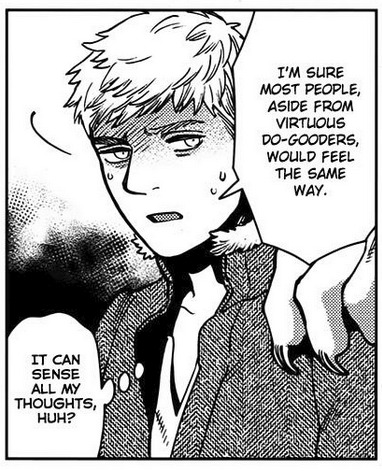
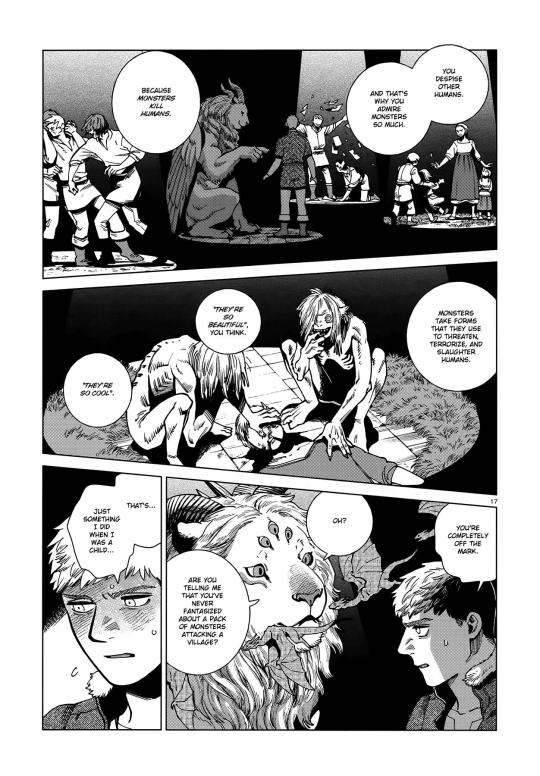
In response to how human society has othered him, Laios distances himself from humans and invests his time and energy into monsters and demi-humans instead. In the DunMeshi world, monsters and demi-humans are the ultimate societal Other. People fear them, exploit them, and even hunt and kill them. As someone who's similarly been mistreated by human society, Laios resonates deeply with monsters.
His desire to become a monster and/or beastman reflects his desire to reclaim agency over how society has ostracized him. If he chooses to become a monster, he gets to place value on what society has deemed despicable. He gets to choose why society hates him and be different on his own terms.
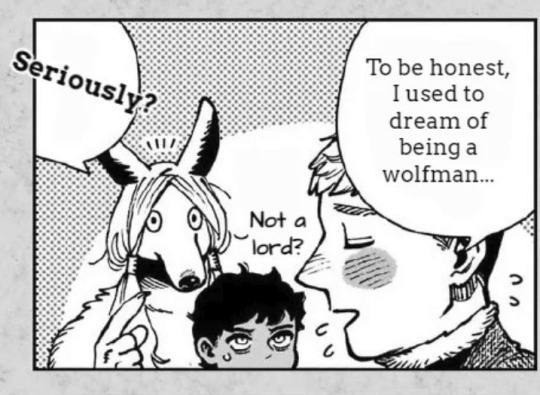
Both textually and thematically, Laios' identification with the Other bleeds into the erotic. More blatantly, he says that he'd have sex with orc women, and his succubus is a monstrous version of Marcille.


The entire story is also steeped in the theme of consumption as carnality. Laios and his party spend the entire manga eating monsters — a taboo physical act which they reap pleasure from; the underlying eroticism isn't difficult to see.
The story also presents consumption as a form of extreme identification. Eating a monster makes the monster part of you through digestion. The line between consuming the monster and becoming the monster — between erotic desire for the monster, demonstrated by eating their flesh, and identifying with the monster — is very blurred. Note that digesting a monster is an act of absorption; it destroys the original creature. Senshi states that consuming a monster erases "its individual identity," and major manga spoilers, but Laios defeats and pacifies the Demon by consuming its desire to eat. We'll come back to this concept later.
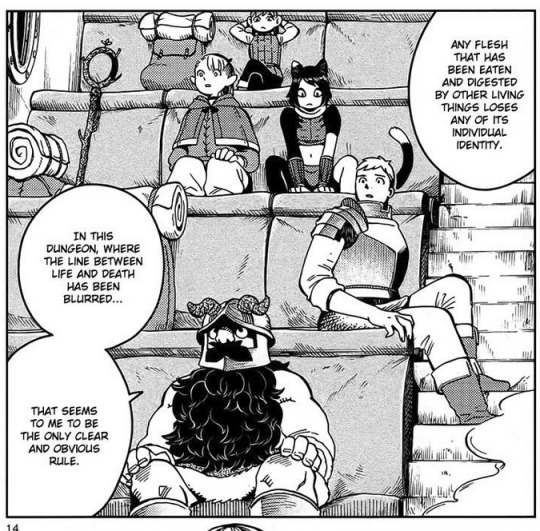
As previously mentioned, Laios is disinterested in most humans. The notable exception to this rule is Toshiro and by extension, the Eastern Archipelago. Laios doesn't seem to know much about the Archipelago before speaking to Toshiro, so he isn't drawn to Toshiro because he's an Easterner. Instead, he's drawn to his "odd appearance."
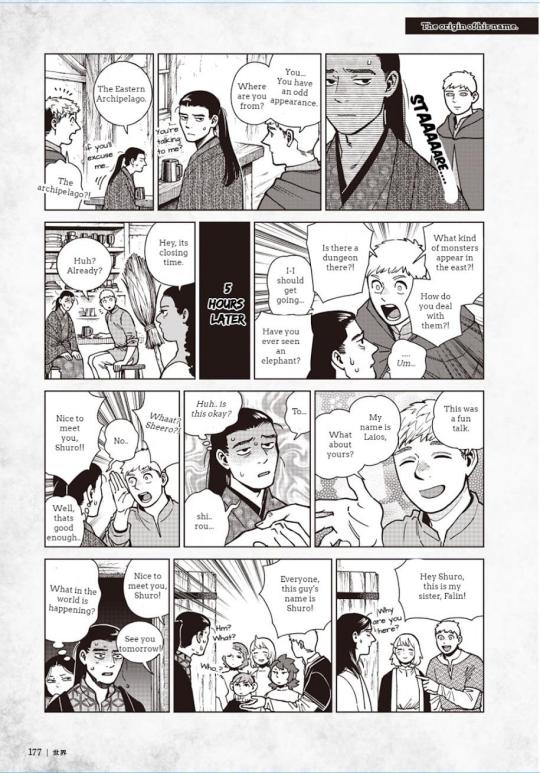
Just like Laios views monsters and demi-humans as a visible Other, Laios views Toshiro as another visible Other. On the Island, Toshiro stands out as a foreigner at first glance. While Laios as a white tallman doesn't appear visibly strange to other people, he's drawn again and again to people and creatures who are immediately visibly "odd." He sees them as understanding what it's like to be different and be mistreated for it, and since he relates to that experience, he wants to learn about them and be closer to them.
Essentially, Laios behaves towards Toshiro and his culture the same way he behaves towards monsters; he wants to know everything about Toshiro's foreign culture — the thing which makes him different. Unintentionally, Laios unintentionally reduces Toshiro to being Japanese; if he wasn't Japanese, Laios would never have approached him.
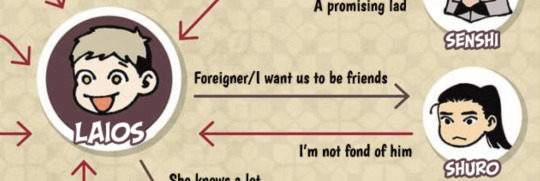
While Laios doesn't have bad intentions, as Toshiro himself acknowledges during their fight, his behavior towards Toshiro still has negative consequences. Laios' harmless interest in monsters translates to fetishization in the context of Japanese culture. He enacts multiple microaggressions against Toshiro and crossing his boundaries.
Laios goes beyond merely learning about Japanese culture. He takes parts of it for himself when he names his sword a Japanese name. Akin to his consumption of monsters, Laios attempts to participate in Toshiro's culture while failing to respect Toshiro himself. Just as eating monsters destroys them, Laios consuming Toshiro's culture while enacting racism against him causes real harm.
Many people have already written about Laios' microaggressions towards Toshiro, but a couple include Laios telling Toshiro that he looks "odd" and asking where he's from, mispronouncing his name as "Shuro," and assuming his favorite food is rice. Laios' treatment and fetishization of Toshiro is racist and harmful. However, I'd like to dive beyond the surface of Laios' micro-aggressive remarks and examine how his obsession with Toshiro becomes a racialized mode of desire, paralleling real world phenomena.
Though no concrete canonical evidence of Laios' feelings towards Toshiro being romantic and/or sexual exists, his interactions with Toshiro have erotic undertones. Their fight dialogue, in particular, revolves around eating, an act the story consistently shows as carnal. During this fight, Laios places his thumb in Toshiro's mouth and asks him, "What's the point of even having a mouth?" Laios' penetration of Toshiro's body via his mouth and his question's potential as an innuendo lend themselves to an erotic reading of the scene's more obvious conflict. Considering the overlap between consumption and carnality throughout the story, it's not a large jump to read eroticism into Laios demanding Toshiro meet his body's physical needs.

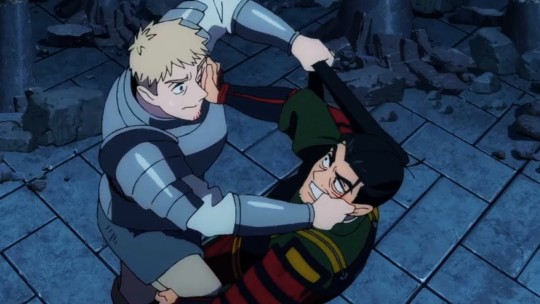
Furthermore, Laios is more enthusiastic about Toshiro than any other human in the series. While he cares deeply about his sister and his friends, Laios repeatedly expresses how much he admires Toshiro. He retains and brings up things like Toshiro's (perceived) favorite food. He wants to go to the East in Falin's place after she rejects Toshiro's marriage proposal, and in the "What-If" extra material, he's adamant about setting up a scenario where Toshiro travels with him through the Dungeon.

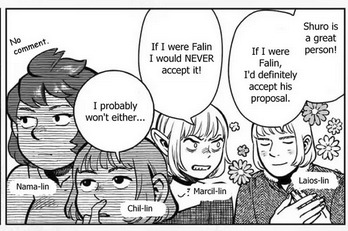

Undoubtedly, Laios is drawn to Toshiro. Since he sees non-white-ness and monstrosity as equivalent markers of societal othering, Toshiro's identity as a foreigner is what cultivates and maintains Laios' interest in him. Even if Laios learns to care for Toshiro as a person, his desire for Toshiro, platonically or otherwise, is still filtered heavily through race within the narrative.
Laios' relationship with his masculinity is also fraught. He broke off his engagement with a girl from his village and doesn't express normative interest in female tallmen. Seeing how the nightmare versions of his parents ask him when he's going to give them grandchildren, Laios experiences societal pressure to conform to a normative performance of masculinity through being attracted to and marrying a tallman woman and creating a family with her.
Laios frequently talks about how cool and admirable Toshiro is when he performs masculinity through combat, etc. He might find Toshiro's Asian masculinity more appealing and more accessible to him than the masculinity that's been forced onto him, precisely because Toshiro's Asian masculinity appears non-normative in a Western lens. But co-opting the masculinities of men of color as a white man would only further feed into the white consumption of cultures of color.
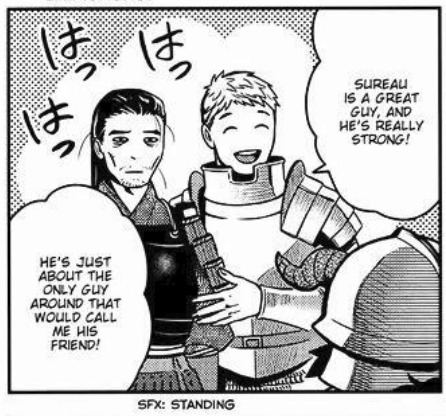
Overall, Laios' entitlement to and consumption of Toshiro's culture mirrors the real-life way white people co-opt and fetishize non-white cultures. Laios' fetishistic treatment of Japanese culture, because of his attraction (platonic or otherwise) to Toshiro, parallels white people's treatment of Asian people in the Western diaspora. I can only speak on the Asian American experience, but Laios immediately being drawn to Toshiro's "odd appearance," obsessing over his culture, and primarily treating Toshiro as a conduit for his said culture feels eerily close to how some white anime and/or K-pop fans act towards Japanese and Korean people.
Similarly to Laios, real queer, neurodivergent, and/or otherwise non-normative white people are marginalized by white Western society. They relate to how society others non-white cultures and/or people of color and latch onto them. While forming human connections based on curiosity and shared experiences is wonderful, white people are often unaware of the racial dynamics at play when they engage with non-white cultures and people of color and unintentionally, end up consuming and fetishizing non-white cultures in detrimental ways.
None of this negates the reality that Laios and Toshiro canonically care for each other. For instance, Toshiro's willingness to hug Laios reveals his genuine familiarity with and affection for him. The racial dynamics of their friendship complicate their relationship in fascinating ways and open up a potential path for Laios' growth. With time and effort, Laios could absolutely unlearn his racism and become a much better friend to Toshiro.
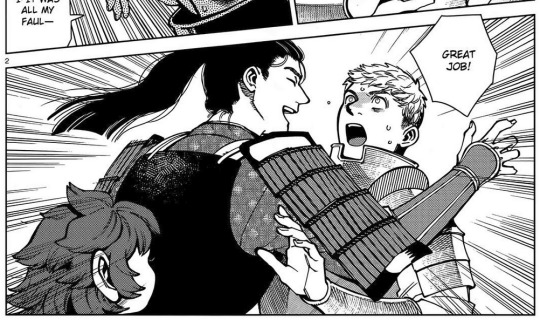
In conclusion, Laios' behavior towards Toshiro is a study in a marginalized white person's identification with and racialized desire for a non-white Other and how even a well-intentioned attempt at connection can replicate harmful racist dynamics. Toshiro's experience with Laios closely parallels real Asian people's struggles with racism and fetishization in our world today.
299 notes
·
View notes
Note
(Pushing Chilchuck in here for the heart meme)

Drop me a character name and I’ll reveal my muse’s heart...
💔 Non-existent || 💗 Very low || 💗💗 A little || 💗💗💗 Hopeful || 💗💗💗💗 High || 💗💗💗💗💗 Maximum

Aha! There he is. I was worried you weren't going to make it, your majesty.
VISUAL ATTRACTIVENESS: 💗💗💗💗 (purely aesthetic appreciation of looks)
Going off of what we mutually agree is how we actually imagine Chil/picture him while writing + interacting? yeah buddy. while the breadth of what she finds visually attractive is pretty extensive, it's probably no secret at this point that Honey has a particular weak spot for the mature sorts—from the little peeks of grey which fleck through thick sideburns, the creases at the inside corners of his eyes echoing long nights, hard work, and worthy stories, to every blessed little hair which trace his arms and legs down to their endpoints; Mr. Tims is, quite frankly, a very appealing man by her standards. A little rough around the edges, with callouses and other little souveniers from ventures in dungeoneering and business alike, he looks very real—earnest, familiar, tangible... While she can (and does) appreciate the prettiness of things which are smooth, flawless, and symmetrical, Honey finds a lot more
FRIENDSHIP LEVEL: 💗💗💗 (how close a friend they consider them)
"Hopeful," as specified in the ratings above, is actually a good descriptor for once—they're still getting to know each other, as things stand, but I'd say the early impressions have been more than favorable, and even if nothing more involved were to come out of their acquaintance: Honey very much enjoys the moments they've stolen from one another, so far, and looks forward to more in the future. She's always in the market for a good drinking buddy, (though hopefully someone will collar both of them a little in that respect), endlessly appreciates a good (potential) business partner... and, perhaps more unique to him than many of her other friendships: she very much enjoyed meeting and entertaining Puckpatti, and would more than likely feel the same about seeing the long-suffering father play off his other daughters. *As the flamboyant, flighty, dramatic and bubbly sort that she is, I think Honey very naturally settles into dynamics with people who are a bit more straight-laced, dry-wit, and practical. Call it grumpy/sunshine or, as I think of it, a classic straight man/funny man compulsion.
SEXUAL DESIRE: 💗💗💗💗+ (...you know ( ͡°ᴥ ͡°) )
When we say DILF in this household we MEAN IT!! The mans seriously needs to relax, blow off some steam, and wholeheartedly indulge himself in ways he clearly doesn't allow himself to often enough—and, perhaps, hasn't for quite some time; to shirk off the mantle of responsibility, propriety, and nagging thoughts of what he should do or how his actions and choices might be perceived to—if only for a short while—listen only to what he wants and gives him pleasure... and she'd be more than happy to help deliver a little bit of that, given the chance ( ꈍ ᴗ ꈍ )
ROMANTIC INTENT: ........💗💗💗½ /+💗 (hoping for a romantic relationship)
Honey vc: ....okay listen. LISTEN.... [takes off running and jumps out the nearest window] ...surprise? (it certainly was for her)—but thinking long and hard about this one... yeah. Maybe it has something to do with her being a fair bit more established in the dunmeshi setting/verse (which is still being fleshed out), not as flighty and wayward in nature, but I'd safely attribute most of it to just Chil being... him, I guess. (Never could have guessed how much of a psychological impact seeing someone be a good dad to their daughter would have, lmao—) Chilchuck is well established in his community, committed to his people and his work (at times to a fault), and is obviously driven to be a part of his family's lives—perhaps making up for a bit of lost time, in some respects, but clearly investing his whole body, heart, and mind into those things he values most, with clear priorities. He establishes clear boundaries and refuses to be taken advantage of, but when he does agree to lend himself to something, he seems to give it 100%. ...all this to say: he doesn't seem the sort to do anything by halves. And that sort of attitude, that consistency, quiets a lot of the worries which usually nudge Honey away from the idea. *oh, and, I'd be remiss not to mention: the fact that he already has children, all mostly grown, and knowing isn't looking to expand it does play a part as well. not wanting to have children of her own has been a big deterrent in her 'romantic' pursuits in years past, as Honey knew she wouldn't be comfortable giving/be able to give a partner the 'family experience' if they decided that's what they wanted.
#unionizedshopkeep#ask memes.#( ship dynamics. )#( answered. )#( ....that last point got so long and I almost typed two more paragraphs. )#( don't perceive me I've been cooking about Them™ too long. )#( AAAAAAAAAAAAAAnyways— )
0 notes